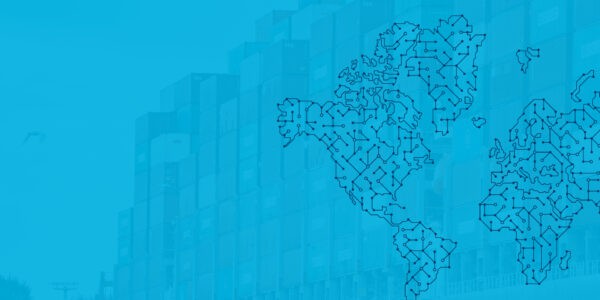
Zurich-based drone specialist Wingtra impresses with enormous growth rates. To maintain this pace, a smoothly functioning supply chain network is essential. COO Marco Schicker explains in an interview how Wingtra interacts with customers and suppliers and why risk management does not restrict but creates freedom.
Wingtra is a leading global provider of commercial drones, specifically for the aerial survey and surveillance market. The company was founded in 2017. Meanwhile, Wingtra has launched the second generation of its drone.
An expert contribution to the 2023 “Future Industry” study
Interview with Marco Schicker, Wingtra AG
Mr. Schicker, more than two-thirds of the companies surveyed for this study still see significant efficiency potential in their supply chain network. How can this potential be realized?
Marco Schicker: In a nutshell, this means that they have to drive the integration of their processes with suppliers and learn to understand their customers better.
How do you push integration with your suppliers at Wingtra?
Marco Schicker: The extension of the value stream design beyond the company’s own boundaries is crucial. When it comes to material flow, it’s a balance between flow and security of supply. Currently, such considerations must be made for computer chips, for example. When it comes to information flow, it is important that everyone in the supply chain network is working from the same set of assumptions. Staying with the chip example, lead times for orders are well over a year. So we have to start our sales and operations planning with this in mind and involve our key suppliers very closely.

Marco Schicker
COO
Wingtra AG

Marco Schicker
COOWingtra AG
Marco Schicker is COO at Wingtra AG. An industrial engineer by training, he began his career at Hilti AG in various supply chain roles before becoming a successful management consultant and founder of several start-ups.
Read moreAnd how do you learn to understand the customer better?
Marco Schicker: By finding out what is really important to the company. It is not enough to just look at the product, but also at the service and handling processes.
Depending on how important issues such as re-procurement, transportation services, pricing structure and packaging are to the customer, Wingtra can align and optimize the value stream accordingly. By finding out what is really important to the company. It is not enough to just look at the product, but also at the service and handling processes. Depending on how important issues such as re-procurement, transportation services, pricing structure and packaging are to the customer, Wingtra can align and optimize the value stream accordingly.
As COO you are responsible for purchasing at Wingtra. Where do you see the department currently positioned within your organization?
Marco Schicker: Purchasing is a central point of contact in our company, both for operations and for development.
With the first generation of our drone, we learned that the stage is set very early in the process to determine whether efficiency potential can be realized later in the product lifecycle. That’s why our purchasing department is involved in product development from the very beginning.
What is the role of your purchasing department?
Marco Schicker: Purchasing also has the task of developing us operationally. This is done, for example, through the standardization of contracts and clear re-procurement rules. Purchasing is also responsible for maintaining relationships with suppliers. We send buyers to key suppliers to better integrate their processes with ours.
How important is electronic data interchange to supply chain network integration?
Marco Schicker: Electronic data interchange can automate, accelerate, and standardize processes. This makes work more efficient by improving the flow of information. However, it is not a cure-all. If the data is incorrect or the supply chain is disrupted, even electronic data interchange won’t help: Suppliers won’t be able to deliver goods, even if we send them automated orders.
38 percent of the companies we surveyed have a dedicated data strategy for their supply chain network, and 43 percent use a platform to share data with partners. Is Wingtra one of them?
Marco Schicker: We don’t have a separate platform for our suppliers. We use our ERP to trigger orders and define framework conditions. We are currently in the standardization phase. Our supplier network strategy is closely linked to our internal processes. To further develop this, we are driving forward the topic of enterprise architecture.
Political, technological, environmental and social factors will continue to impact supply chain networks. In this context, how important is the implementation of risk management?
Marco Schicker: For me, risk management is essential. This is not about avoiding every possible risk. Instead, the company must match the effort to the risk. It is important to understand which risks are most critical to a company. It is then possible to decide whether and with what measures to respond to individual risk factors.
In addition, good risk management creates the transparency needed to make decisions. This helps both leaders and employees. With a better understanding of key business risks, they can make much more independent decisions on a day-to-day basis.
HOW DO COMPANIES HANDLE DATA IN THE SUPPLY CHAIN NETWORK?

More about Supply Chain

Supply Chain Network Management
We are thoroughly knowledgeable about the supply-chain matrix and have a solid command of every level of its requirements. We support you in optimizing your supply-chain processes, structures and networks, and in doing so we always focus on achieving the ideal output for the entire process. By initially focusing on fast and sustainable successes in pilot areas, we create a momentum towards change that optimizes the entire process.
Read more
Supply Chain Network Management
What will the stable supply chain network of tomorrow look like? An answer to this and other questions can be found in our white paper.
Read more
“Asking the right questions from the start”
Böllhoff is the competence leader in fastening technology. Managing Director Marcel Rupprecht explains in an interview, how Lean Management is practiced at the company and what role managers play in it.
Read more

